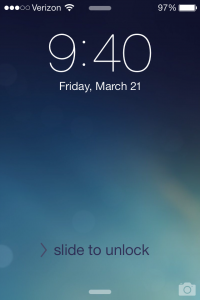 I’ve checked the settings on my iPhone and I cannot find one that will show acceptable time.
I’ve checked the settings on my iPhone and I cannot find one that will show acceptable time.
One of the morning Psalms in the daily office for today is Psalm 69. The Psalm was written by King David and in it he laments his sad situation and pleads for God’s help. “The waters have come up to my neck,” he cries in the first verse. “I sink in deep mire where there is no foothold,” he continues. No one knows exactly what episode or circumstance in the king’s life, the sweet psalmist of Israel’s journey with God, prompted the psalm. The picture of water up to the neck and deep mire where there is no foothold, however, describes episodes and circumstances common to the lives of all people whether they be prince or pauper.
As the psalm unfolds, David defends his cause against unknown accusers. He has acted righteously, yet he is mocked by those from whom he might expect high regard and due respect, “I am the talk of those who sit in the gate, and the drunkards make songs about me” (verse 12).
Then in verses 13 and 14 he lays his plea before God, “But as for me, my prayer is to you, O Lord. At an acceptable time, O God, in the abundance of your steadfast love answer me in your saving faithfulness. Deliver me from sinking in the mire; let me be delivered from my enemies and from the deep waters.” It is a prayer for deliverance from the sinking mire and from his enemies, the drunks at the city gate among them.
If I were in David’s position – in the mire, water up to my neck, the object drunkards’ derisive songs – I think I would add some urgency to my prayer. Some “right now.” Some “I’ve had enough.”
But David asks God to answer him “at an acceptable time.” What time is an acceptable time? I’ve checked the settings on my iPhone and I cannot find one that will show acceptable time.
“Acceptable” is probably the best translation of the Hebrew word David uses, though some translations use “favorable” or even “right.” Acceptable time is acceptable before God in the same way that an offering rightly made is acceptable. It fits God’s plan for things.
I am not a Hebrew living at the dawn of the first millennium before Christ. I am an American living in the early years of the third millennium after Christ. I have been told that I can buy now and pay later. I am accustomed to instant gratification and same-day delivery. For me the only acceptable time is now.
As far as I know, the drunks at the local pub are not singing mocking songs about me. If you’re at the local pub and the drunks do start singing about me, I really don’t need to know. But I have from time to time felt the water rising up to my neck and have searched in vain for footholds as I have sunk in the deep mire. Water rising, sinking in deep mire with no foothold, it is hard to say, “Deliver me at an acceptable time, O God.”
We live in a world where marriages unravel and employment ends. Our technology disappoints us in a search for a missing plane or for the cure to a devastating disease. Friends abandon us and the church is not the perfect place we thought it would be. A king who lived 3,000 years ago, a man after God’s own heart, we are told, teaches us to pray, “At an acceptable time, O God…”
Waiting for God’s acceptable time is not just a matter of shrugging our shoulders and saying, “What will be will be.” Waiting for God’s acceptable time is hard work, for God’s acceptable time is like an appointment made; it can be missed, forgotten in the rush of things. It passes by and we never notice it. Our eyes are fixed on that thing we’re thinking about buying now and paying for later. Oh, and make it same-day delivery, please.
As far as I can tell, I am standing on firm ground, the water laps on the shore far away and the miry bog is on the distant horizon. But it is times like these, good times, that are the best times to learn acceptable time.
Sinking times or strong times, may we learn to read acceptable time with the same accuracy that my iPhone reads Eastern Daylight Time.
